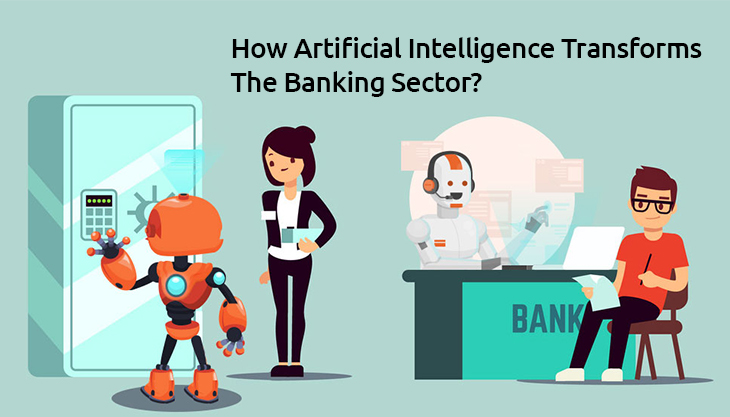Industries are being redefined by digital disruption, and firms are operating differently. Every sector is evaluating its alternatives and implementing strategies to provide value in the technology-driven environment.
The most notable of these revolutionary shifts in the banking industry is the growing emphasis on consumer needs.
Customers that are tech aware and regularly interact with cutting-edge technologies want banks to provide smooth experiences.
For services like mobile banking, e-banking, and real-time money transfers, banks have expanded their industrial landscape to include retail, IT, and telecom in order to meet these expectations.
In this article, we’ll see how artificial intelligence transforms the banking sector?
1. Artificial Intelligence Used For Criminal Detection
There are models for preventing financial crime that are ever-evolving. The "Black Forest" AI system software analyses these transactions and keeps track of any questionable cases.
For each capital transfer, for instance, a number of factors are taken into consideration, including the sum, the currency, the nation to which it is being sent, and the nature of the transaction—was it completed online or in person?
When a criterion does not fit the expected patterns, "Black Forest" alerts the account manager to the anomaly. He sends the transaction to the Anti-Financial Crime division if he also thinks it's questionable.
The AI gains the ability to classify transactions correctly and only report those where there is a genuine threat of criminal activity as feedback volume increases.
2. Banks Are Supporting The Sustainable Transition Using AI
AI models are appealing to other sectors, like sustainability, for example, because they can quickly process vast amounts of data. Banks in the European Union will have to disclose which transactions are green starting in 2023.
They will follow the EU classification, which specifies which loans, for example, for solar and wind power generation, are regarded as green, to do this.
Financing for a medium-sized business to purchase tools or systems that would make it more environmentally friendly is also considered green.
Banks require a significant amount of fresh data from their business clients in order to accurately categorize the transactions.
3. AI Reduces Operational Expenses
The paperwork is one issue that the banking industry will inevitably have to cope with. Each day, bank personnel must manage tons of paperwork. Such time-consuming, repetitive procedures might raise operating expenses and are more likely to involve human mistakes.
AI can be used to resolve this. It does away with these labor-intensive and prone to error human operations. According to a study reported in Business Insider, banks might save as much as USD 447 billion by 2023 by transitioning to an AI banking system.
For instance, banks may automate many facets of human work with the aid of machine learning (ML), automation tools, and AI assistants which Artificial Intelligence companies can help banks set up and provide guidance with.
Additionally, AI is essential in allowing banking institutions to expand their current scope of activities, which lowers operational costs and opens up new revenue streams.
4. AI Enhances Customer Service
Financial organizations have been able to influence how their customers view them thanks to artificial intelligence's impact on banking, particularly in the customer care sector.
Any organization's performance and bottom line are directly impacted by customer happiness, and the banking sector is no different.
Banks are now able to provide their customers with 24/7 support no matter where they are or what time zone they are in thanks to AI chatbots and voice assistants.
Additionally, banks may efficiently meet consumer needs by gaining valuable information from their digital footprint and payment behaviour by employing AI and ML for faster and more detailed research.
AI also aids in tailoring the bank's offers for a completely different audience, continually growing their current clientele.
AI enables financial organizations to offer the appropriate services to their customers at the correct time.
5. AI makes Risk Management Better
AI has a significant impact on risk management in the banking industry. The type of data that financial institutions like banks manage every day makes them vulnerable to risk.
For instance, banks use AI-powered solutions that can swiftly identify trends from many sources and analyze enormous volumes of data. This can identify people or companies who might not be able to repay their debts and helps predict and prevent credit risks.
Additionally, it can spot bad behavior like identity theft and money laundering. Risk management has been revolutionized by AI tools and algorithms, resulting in a safer and more dependable banking experience.
It is therefore obvious that the use of artificial intelligence in banking has enhanced risk management.
6. AI Improves Adherence To Regulations
One of the most underappreciated effects of artificial intelligence in banking is this. One of the most highly regulated and stringent sectors in the world is banking.
To prevent, spot, and correct any deviations, illegalities, or nonconformities in their operations, banks must adhere to stringent rules, regulations, and guidelines.
Banks must also regularly alter their procedures and workflows to comply with compliance rules because they change frequently.
However, banks may simplify, automate, and streamline the regulatory compliance processes and workflows by leveraging the capabilities of AI in this area.
Banks may thus overcome the enormous regulatory compliance issues they currently face by strategically utilizing AI-powered regulatory compliance solutions.
Banking's future is now. In the future, the banking industry will have an even greater need for innovative technology like AI as the globe moves swiftly toward full digital transformation.
As a result, artificial intelligence has had and will continue to have a significant impact on banking, creating more adaptable and agile business models to meet the expanding needs of this digital age.














Post Comments